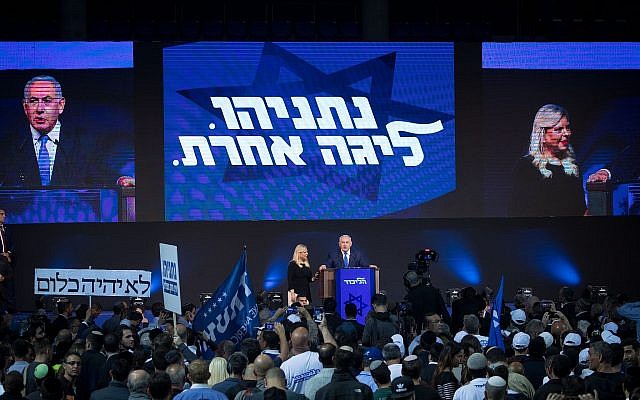Prime Minister Benjamin Netanyahu clinched a clear electoral victory Wednesday morning, with some 97 percent of votes showing his Likud party tied with Blue and White, but the right-wing bloc with a decisive lead and Netanyahu thus safely en route to forming a governing coalition.
With more than four million votes counted as of 9 a.m., Likud had snagged 26.27% of the vote, or 35 seats in the 120-seat legislature — the party’s best result since the 2003 election (when it won 38 seats under Ariel Sharon), and its best under Netanyahu.
Meanwhile Likud’s main rival in the election, the Blue and White party led by Benny Gantz and Yair Lapid, won 25.94% of the vote, which would also give it 35 seats.
Get The Times of Israel’s Daily Edition by email and never miss our top storiesFREE SIGN UP
In actual numbers, only some 14,000 votes separated the two biggest parties.
 Head of the Blue White party Benny Gantz (2L) and his top allies Moshe Ya’alon, Gabi Ashkenazi and Yair Lapid greet their party supporters following the release of election exit polls at the party headquarters in Tel Aviv, on April 09, 2019 (Hadas Parush/FLASH90)
Head of the Blue White party Benny Gantz (2L) and his top allies Moshe Ya’alon, Gabi Ashkenazi and Yair Lapid greet their party supporters following the release of election exit polls at the party headquarters in Tel Aviv, on April 09, 2019 (Hadas Parush/FLASH90)
No other party appeared to break double digits in number of seats.
With five right-wing and ultra-Orthodox parties managing to get some 30 seats together, though, Netanyahu could confidently work to form a government similar to his current right-wing coalition, with a solid 65 seats.
On the other side of the fence, four left-wing and Arab parties combined for just 20 seats, putting them en route to the opposition along with Blue and White, pending coalition jostling.
Coming in at a surprising third and fourth places were the ultra-Orthodox parties Shas and United Torah Judaism, with 6.10% (8 seats) and 5.90% (8 seats) respectively.
 Rabbi Israel Hager votes for Israel’s parliamentary election at a polling station in Bnei Brak, Israel, Tuesday, April 9, 2019. (AP Photo/Oded Balilty)
Rabbi Israel Hager votes for Israel’s parliamentary election at a polling station in Bnei Brak, Israel, Tuesday, April 9, 2019. (AP Photo/Oded Balilty)
Fifth was the predominantly Arab Hadash-Ta’al with 4.61% or six seats.
 Avi Gabbay, leader of the Israeli Labor Party, speaks during an elections campaign event at Rabin Square in Tel Aviv, April 6, 2019. (Tomer Neuberg/Flash90)
Avi Gabbay, leader of the Israeli Labor Party, speaks during an elections campaign event at Rabin Square in Tel Aviv, April 6, 2019. (Tomer Neuberg/Flash90)
The historically dominant Labor Party crashed to sixth place with 4.46% (six seats), the party’s worst showing in its 71-year history.
With five seats each were Yisrael Beytenu (with 4.15%) and the Union of Right-Wing Parties (3.66%).
Meanwhile Meretz (3.64%), Kulanu (3.56%) and Arab party Ra’am-Balad (3.45%) had four seats each.
NEAR FINAL RESULTS IN 2019 ELECTIONSWith around 95% of votes counted35353535888866665555444444000000LikudBlue and WhiteShasUTJHadash-Ta’alLaborYisrael BeytenuURWPMeretzKulanuRa’am-BaladNew RightZehutGesher0510152025303540

 Zehut party leader Moshe Feiglin addresses supporters and journalists at what was meant to be a victory party in Ramat Gan on April 9, 2019. (Melanie Lidman/Times of Israel)
Zehut party leader Moshe Feiglin addresses supporters and journalists at what was meant to be a victory party in Ramat Gan on April 9, 2019. (Melanie Lidman/Times of Israel)